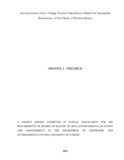| dc.description.abstract | Ecotourism is widely practiced as a form of tourism development in many countries around the world. However, its sustainability has elicited strong debate among scholars. Kenya is among the top leading ecotourism destinations. Most recently, Western Kenya Tourism Circuit was identified for niche ecotourism product development under Kenya Vision 2030. This is enunciated by the Tourism Policy which emphasizes the need for spatial diversification of tourism activities in the country through ecotourism. Despite this noble policy intention, there is no methodological framework to ensure that the type of ecotourism practiced in Kenya is sustainable, inclusive and guarantees direct benefits to the local communities.
This study therefore sought to explore the potential of eco-village tourism as a model for sustainable development of ecotourism in Western Kenya Tourism Circuit. Specifically, the study objectives were to assess the socio-economic viability of local tourism activities, local communities‟ awareness of tourism attractions and the potential of eco-village tourism model for sustainable ecotourism. The study hypothesized that there is no significant relationship between socio-economic viability and eco-village tourism; there is no significant relationship between local community‟s awareness and participation in local tourism activities and that eco-village tourism is not a viable model for sustainable ecotourism development in Western Kenya Tourism Circuit. The research methodology employed both quantitative and qualitative data collection techniques. The target population consisted of 962 key tourism stakeholders. Multi-stage Stratified Random Sampling and Interval Random Sampling were used to determine the desired sample size of 384. Data was analyzed using descriptive statistics, linear regression and chi-square test to draw conclusions.
The study found out that 61% of local communities engaged in tourism related economic activities benefits financially while 48.2% are directly employed. A total of 51% earn Ksh. 10000 average income indicating equitable distribution of tourism related economic activities. The findings revealed that majority (57%) feel better off working in tourism justifying the socio-economic viability and sustenance of local tourism activities. This is augmented by the availability of tourism attractions, efficient infrastructural and superstructural accessibility to support eco-village tourism development in the region. The study further revealed that the
vi |
socio-economic benefits from local tourism activities can significantly increase the local communities‟ participation in local tourism P = 0.008 (P<0.05). The study also showed that local communities‟ awareness of the value of natural resources and tourism attractions (96.1%) can significantly influence participation in local tourism activities P = 0.000(P<0.05). The further established positive correlation between sustainability concerns of local communities and their preference for eco-village tourism (0.169=V=0.280; P = 0.000). Thus the study concludes that eco-village tourism is a suitable model for sustainable ecotourism development. The findings of this research therefore have significant implication for policy direction and practice from the eco-village tourism point of view for sustainable development in Kenya and developing countries. The study contributes immensely to the existing body of knowledge. In terms of practice, the study recommends more policy interventions in promoting integrated eco-village tourism management plans that prioritize local communities‟ interests. Finally, further research is recommended especially on the impact of government interventions on the development of eco-village tourism. | en_US |



